Related Research Articles

Distance education, also called distance learning, is the education of students who may not always be physically present at a school. Traditionally, this usually involved correspondence courses wherein the student corresponded with the school via mail. Today, it usually involves online education. A distance learning program can be completely distance learning, or a combination of distance learning and traditional classroom instruction. Massive open online courses (MOOCs), offering large-scale interactive participation and open access through the World Wide Web or other network technologies, are recent educational modes in distance education. A number of other terms are used roughly synonymously with distance education.
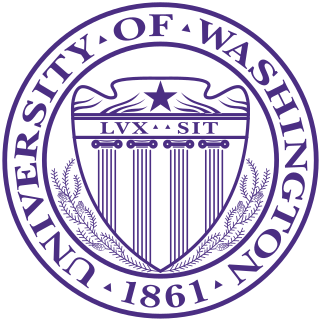
The University of Washington is a public research university in Seattle, Washington. Founded in 1861, Washington is one of the oldest universities on the West Coast; it was established in Seattle approximately a decade after the city's founding to aid its economic development. Today, the university's 703 acre main Seattle campus is in the University District, Puget Sound region of the Pacific Northwest. The university also has campuses in Tacoma and Bothell. Overall, UW encompasses over 500 buildings and over 20 million gross square footage of space, including one of the largest library systems in the world with more than 26 university libraries, as well as the UW Tower, lecture halls, art centers, museums, laboratories, stadiums, and conference centers. The university offers degrees through 140 departments in various colleges and schools, and functions on a quarter system.

Shays' Rebellion was an armed uprising in Western Massachusetts and Worcester in response to a debt crisis among the citizenry and in opposition to the state government's increased efforts to collect taxes both on individuals and their trades. The fight took place mostly in and around Springfield during 1786 and 1787. American Revolutionary War veteran Daniel Shays led four thousand rebels in a protest against economic and civil rights injustices. Shays was a farmhand from Massachusetts at the beginning of the Revolutionary War; he joined the Continental Army, saw action at the Battles of Lexington and Concord, Battle of Bunker Hill, and Battles of Saratoga, and was eventually wounded in action.

Robert Sedgewick is the founding chair and the William O. Baker Professor in Computer Science at Princeton University and was a member of the board of directors of Adobe Systems (1990-2016). He previously served on the faculty at Brown University and has held visiting research positions at Xerox PARC, Institute for Defense Analyses, and INRIA. His research expertise is in algorithm science, data structures, and analytic combinatorics. He is also active in developing the college curriculum in computer science and in harnessing technology to make that curriculum available to anyone seeking the opportunity to learn from it.

City University of Seattle (CityU) is a private university in Seattle, Washington. In 2016–17, CityU enrolled 6,755 students worldwide. The university consists of the School of Management, Albright School of Education, School of Arts and Sciences, School of Applied Leadership, the Technology Institute, and Washington Academy of Languages. CityU of Seattle offers campus education around the world and online education. CityU is part of the National University System, a private nonprofit university system.

Institute for Systems Biology (ISB) is a non-profit research institution located in Seattle, Washington, United States. ISB concentrates on systems biology, the study of relationships and interactions between various parts of biological systems, and advocates an interdisciplinary approach to biological research.
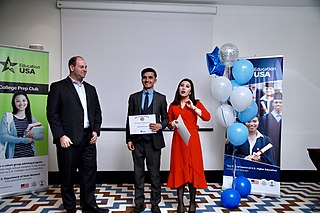
EducationUSA is a U.S. Department of State network of over 400 international student advising centers in more than 170 countries. EducationUSA is officially a branch in the Office of Global Educational Programs in the Bureau of Educational and Cultural Affairs (ECA). ECA fosters mutual understanding between the United States and other countries by promoting personal, professional, and institutional ties between private citizens and organizations in the United States and abroad, as well as by presenting U.S. history, society, art and culture in all of its diversity to overseas audiences.

Open education is an educational movement founded on openness, with connections to other educational movements such as critical pedagogy, and with an educational stance which favours widening participation and inclusiveness in society. Open education broadens access to the learning and training traditionally offered through formal education systems and is typically offered through online and distance education. The qualifier "open" refers to the elimination of barriers that can preclude both opportunities and recognition for participation in institution-based learning. One aspect of openness or "opening up" education is the development and adoption of open educational resources in support of open educational practices.
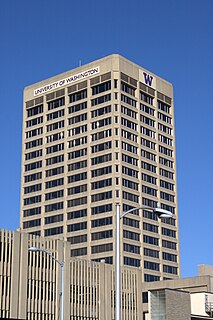
University of Washington Continuum College, formerly Educational Outreach is the continuing education and professional development unit of the University of Washington (UW), in Seattle, Washington. Founded in 1912, UW Continuum College was originally the branch of the university offering correspondence courses. Today, this UW unit provides wide-ranging programs for non-traditional and lifelong learning students, including degree programs, certificate programs and select courses through UW Professional & Continuing Education, Massive Open Online Courses (MOOCs), UW in the High School, UW Summer Quarter, UW Summer Youth, UW International & English Language Programs, Osher Institute for Lifelong Learning at the UW, and Conference Services. The programs provided are fee-based and self-sustaining and do not receive state funds for support.

Andrew Yan-Tak Ng is a British-born American computer scientist and technology entrepreneur focusing on machine learning and AI. Ng was a co-founder and head of Google Brain and was the former Chief Scientist at Baidu, building the company's Artificial Intelligence Group into a team of several thousand people.
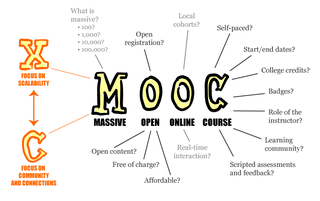
A massive open online course is an online course aimed at unlimited participation and open access via the Web. In addition to traditional course materials, such as filmed lectures, readings, and problem sets, many MOOCs provide interactive courses with user forums or social media discussions to support community interactions among students, professors, and teaching assistants (TAs), as well as immediate feedback to quick quizzes and assignments. MOOCs are a widely researched development in distance education, first introduced in 2008, that emerged as a popular mode of learning in 2012.

Coursera Inc. is an American massive open online course provider founded in 2012 by Stanford University computer science professors Andrew Ng and Daphne Koller. Coursera works with universities and other organizations to offer online courses, certifications, and degrees in a variety of subjects. In 2021 it was estimated that about 150 universities offered more than 4,000 courses through Coursera.

edX is an American massive open online course (MOOC) provider created by Harvard and MIT. It hosts online university-level courses in a wide range of disciplines to a worldwide student body, including some courses at no charge. It also conducts research into learning based on how people use its platform. edX is a nonprofit organization and runs on the free Open edX open-source software platform. On June 29th 2021, it was announced that edX had been purchased by the educational technology company 2U.
In higher education a microdegree also microcredentials and micromasters is a qualification focused upon a specified professional or career discipline and typically comprises one or more sources of accelerated educational experiences. Microdegrees are a single manifestation of Competency Based Education (CBE) which seeks to tie credentialing to specific skills sets. Micro-credentials may be completed on-site, online or in a blended format.
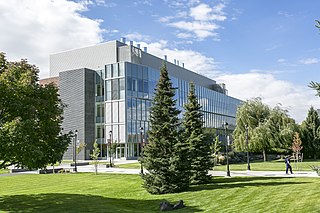
The Elson S. Floyd College of Medicine is a public medical school headquartered in Spokane, Washington. Founded in 2015, it is part of Washington State University, and is the second public medical school in the state of Washington. It welcomed its inaugural class in the fall of 2017, joining the University of Washington and Pacific Northwest University of Health Sciences as one of three medical schools in the state.

Online learning involves courses offered by primary institutions that are 100% virtual, excluding massively open online courses (MOOCs). Online learning, or virtual classes offered over the internet, is contrasted with traditional courses taken in a brick-and-mortar school building. It is the newest development in distance education that began in the mid-1990s with the spread of the internet and the World Wide Web. Learner experience is typically asynchronous, but may also incorporate synchronous elements. The vast majority of institutions utilize a Learning Management System for the administration of online courses. As theories of distance education evolve, digital technologies to support learning and pedagogy continue to transform as well.
Open Educational Practices in Australia refers to the development, implementation and use of Open educational resources (OER), open access, open learning design, open policies, and Massive Open Online Courses (MOOCs) to open up education in Australia.

The University of Washington College of Education is the school of education at the University of Washington (UW). The UW College of Education offers both undergraduate and graduate degrees and is one of the top schools of education in the United States.
As part of EdTech, online program managers (OPMs) provide products and services on which educational institutions can run online courses. OPMs, mostly for-profit enterprises, have allowed universities to enter into the online education business and gain market share without the need to build their own platform. In effect, online program managers are also outsourcers of edtech labor. OPMs have grown substantially as universities have seen the benefit of students reaching beyond their geographical area while recognizing their lack of skills in creating, maintaining, and optimizing online courses. Proponents of outsourcing from for-profit companies say that it "helps universities save money and makes them more nimble and efficient." Moody's Dennis Gephardt, however warns that "more and more are cutting closer to the academic core."
References
- ↑ Szatmary, D. P. (1980). Shays' Rebellion: The making of an agrarian insurrection. Amherst: University of Massachusetts Press.
- ↑ bambu32 (2 October 2012). "shay's rebellion". Youtube.com. Retrieved 7 July 2017.
- ↑ Szatmary, D. P. (1987, 1991, 1996, 2000, 2004, 2007, 2010, 2014). Rockin' in Time: A Social History of Rock-and-Roll. Upper Saddle River, N.J.: Prentice Hall. Eight editions.
- ↑ Szatmary, D. P. (1996). A Time to Rock: A Social History of Rock and Roll. New York: Schirmer Books.
- ↑ For example: Szatmary, David (1994), Ron Wynn (ed.), All Music Guide to Jazz , M. Erlewine, V. Bogdanov, San Francisco: Miller Freeman, p. 144, ISBN 0-87930-308-5
- ↑ Szatmary, David. "Review of Rock Star" Archived 2017-02-17 at the Wayback Machine , LibraryJournal.com, September 12, 2014.
- ↑ The Seattle Post-Intelligencer. June 12, 1992.
- ↑ Williams, David. D., Howell, Scott and Hricko, Mary, eds. (2006) Online Assessment, Measurement and Evaluation: Emerging Practices. 79-82. London, Information Science Publishing.
- ↑ O'Donnell, Catherine. "UW Will Expand Certificate Programs in Abu Dhabi". UW Today. June 5, 2008.
- ↑ Lederman, Doug. "Educause, Gates Unveil Grants for 'Breakthrough' Models. Inside Higher Education. October 18, 2012.
- ↑ McElroy, Molly. "UW Launches Online Bachelor's Degree Completion Program in Social Sciences". UW Today. March 31, 2014.
- ↑ Szatmary, D. (2000). The Internet, Partnerships, and Online Education. Continuing Higher Education Review. 64, 43-46.
- ↑ Lewin, Tamar. "Universities Reshaping Education on the Web". New York Times. July 17, 2012.
- ↑ Rivard, Ry. "No-Bid MOOCs. Inside Higher Education. July 17, 2013.
- ↑ Long, Katherine. "UW Expands Online Courses, This Time from Harvard, MIT". Seattle Times. May 21, 2013.
- ↑ "Coursera Shakes Up Higher Education, adds 12 US and European Institutions". ICEF Monitor. July 18, 2012.
- ↑ Young, Jeffrey. "Inside the Coursera Contract: How an Upstart Company Might Profit from Free Courses". The Chronicle of Higher Education. July 19, 2012.
- ↑ Szatmary, David. (Fall 2011) Activity-Based Budgeting in Higher Education. Continuing Higher Education Review. 75, 69-85.